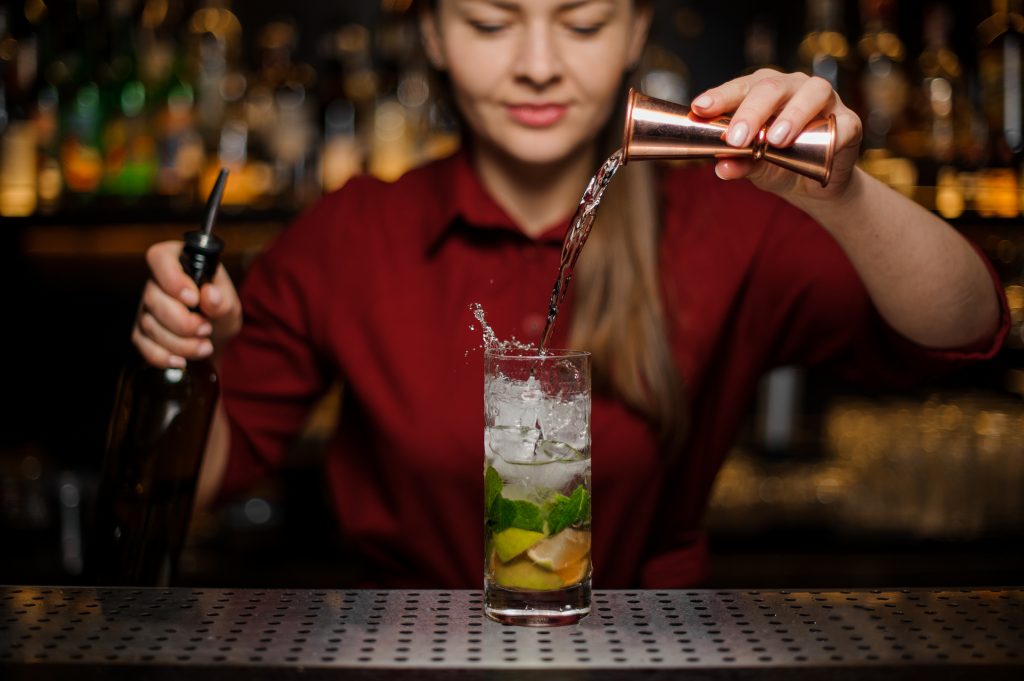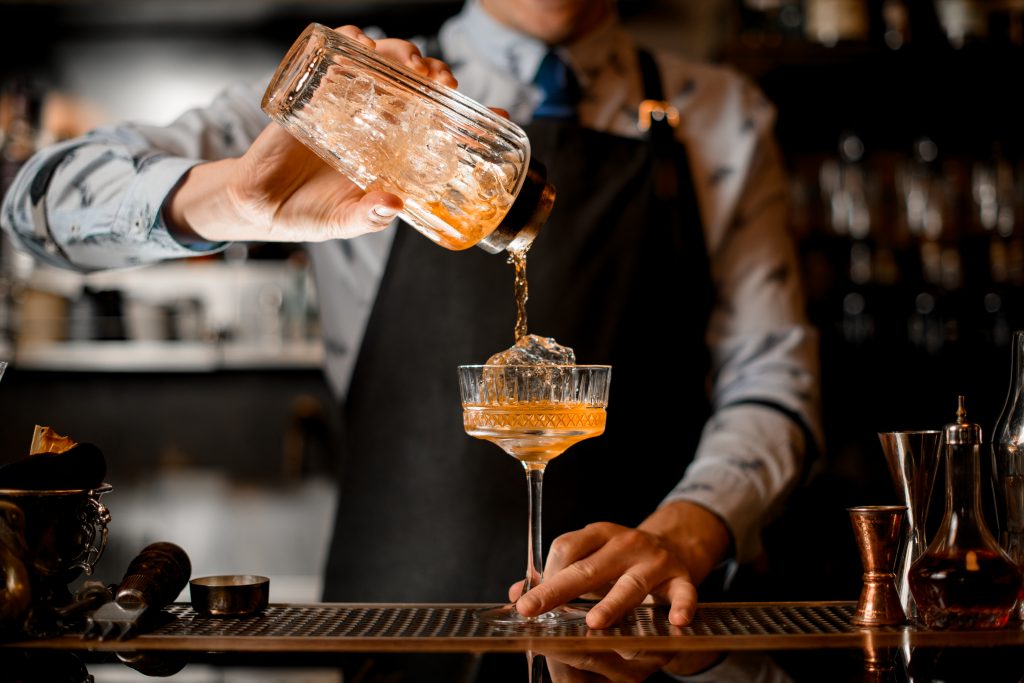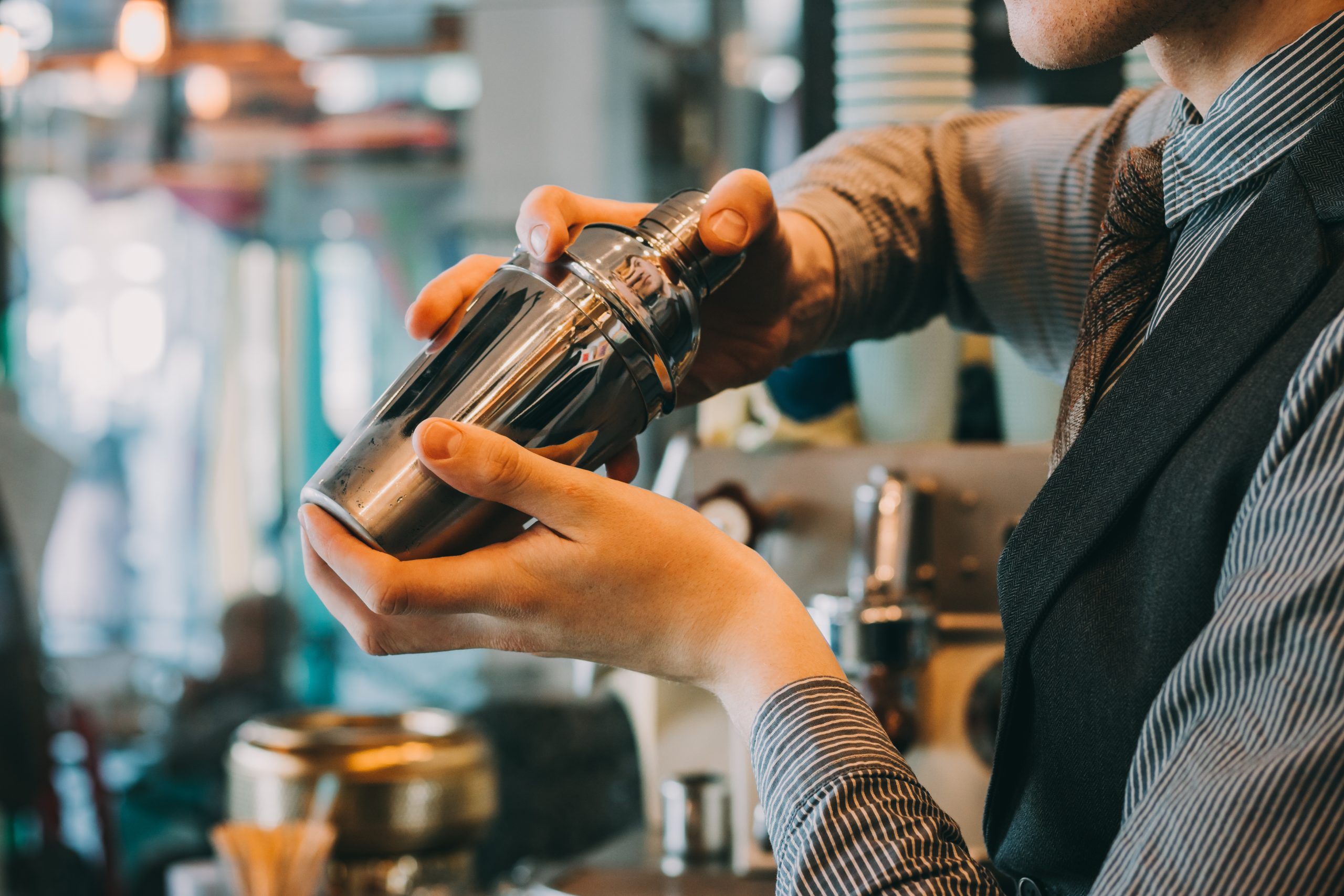 If you are creative, responsible, social, and a hard worker, bartending might be in your future. Bartending is more than just mixing up drinks and serving patrons. Good bartenders establish rapport with customers, memorize hundreds of cocktail recipes, and even come up with their own creations. They carry out these tasks while keeping the bar clean, organized, and well-stocked. Bartending is not an easy job, but work can be stable and the money consistent. If you’ve dreamed of becoming a bartender, it’s important to be informed. Below, you’ll find all the information you need to decide if bartending is the career for you.
If you are creative, responsible, social, and a hard worker, bartending might be in your future. Bartending is more than just mixing up drinks and serving patrons. Good bartenders establish rapport with customers, memorize hundreds of cocktail recipes, and even come up with their own creations. They carry out these tasks while keeping the bar clean, organized, and well-stocked. Bartending is not an easy job, but work can be stable and the money consistent. If you’ve dreamed of becoming a bartender, it’s important to be informed. Below, you’ll find all the information you need to decide if bartending is the career for you.
How Do You Become a Bartender?
To become a bartender, you won’t need any formal education. However, you will need to acquire the skills necessary to perform the tasks required for the job. Most bartenders undergo on-the-job training that lasts a few weeks. Some aspiring bartenders gather their skills by attending bartender school. Bartending programs are available at select vocational or technical schools. It’s in these schools that students become familiar with state and local laws, as well as with regulations concerning the sale of alcohol. In these programs, students also learn cocktail recipes and how to stock a bar. Since on-the-job training is the most common path to becoming a bartender, some employers offer self-study programs for new hires. These programs may be administered online, through videos, or via instructional booklets. Also, some states require bartenders to complete a responsible-server course. This course may be available in person or online, and it offers exposure to state and local laws, as well as information on conflict management and responsible serving practices.
What Degree Does a Bartender Need?
There’s no bartender degree needed to work in this occupation. Most bartenders receive on-the-job training, but don’t seek a college degree to qualify for employment. Training to become a bartender usually takes a few weeks. Depending on the employer, new employees may be required to undergo a self-study program, complete an online course, watch videos, or read through instructional booklets that teach certain responsible serving practices and good customer-service skills.
Education for Bartenders
The education for bartenders is pretty straightforward. Most bartenders learn on the job, while others enroll in a technical or professional school program that offers classes in bartending. Either route is sufficient to land a job as a bartender, but the most common path to this occupation is to learn on the job. On-the-job training, the most common path to becoming a bartender, takes about one month. However, some aspiring bartenders seek bartender schooling at a vocational or technical school that offers bartending classes. These programs vary in length. Some last a few weeks and result in a certificate of completion, while others last months. Some schools even assist their graduates with finding jobs after they’ve finished the program. 
Bartender Schooling and Training
As indicated above, you don’t need a degree to become a bartender. However, you may have to attend bartender school, which consists of a few weeks of training. Most employers offer on-the-job training for new bartenders. Training lasts no longer than a month and includes closely working with a more experienced bartender. Also, depending on the employer, new bartenders will undergo bartender schooling, which may consist of an online or in-person course, instructional booklets, or videos that explain important aspects of the job. In addition to on-the-job training, some states require bartenders to complete a responsible-server course to work in the profession. The course covers local and state alcohol laws, how to deal with conflict on the job, and responsible serving practices. As part of some training programs, you’ll learn how to integrate yourself as a valuable team member and build rapport with other staff. Once you’ve finished the required training and/or courses, you’ll be skilled to work as part of the establishment.
Best Degrees for Bartenders
The best degrees for bartenders include:
- Business
- Hospitality Management
- Mixology
While college is not required for a bartending career, a degree can increase your career prospects by showing that you have the necessary skills and knowledge. Some of the best degrees for bartenders include an associate’s degree or bachelor’s degree in business administration or business management. Having a degree may help you move up the ranks and into a supervisory or management position. Business degree programs offer courses in managing organizational change, principles of management, and principles of marketing. These are great courses to take if you aspire to move into management or sales positions. Another degree to consider for your bartending position is a degree in mixology. While the degree is not as common as a business degree, some community colleges or technical schools offer associate’s degrees in mixology. Other schools offer online courses in bartending or mixology. These courses take about one month to complete and cover bar and lounge management, inventory and cellar management, and mixology. Some bartenders who aspire to work in management pursue a degree in hospitality management. In these two- and four-year programs, students learn the ins and outs of the hospitality industry. Courses cover topics such as the following:
- Club management
- Functional accounting
- Introduction to hospitality industry
- Principles of food and beverage
- Revenue management
- Tourism planning and development
What Does It Take to Be a Bartender?
In addition to the training acquired on the job, becoming a bartender takes certain skills and qualities. To be successful, a bartender should possess the following important qualities that aren’t always learned on the job.
- Communication skills: Any job that requires public interaction calls for strong and effective communication skills. Bartenders must listen to customer orders, explain drink recipes and food items, and recommend menu options. They should be able to cultivate a welcoming environment when first greeting a customer, and offer warm conversation throughout the interaction. Good communication skills are a must for this occupation.
- Customer-service skills: As with strong communication skills, a bartender must have good customer-service skills. To ensure repeat business and good online reviews, good customer-service skills are necessary.
- Decision-making skills: Bartenders make quick decisions. For example, when a customer asks for a recommendation, a bartender must be able to offer suggestions quickly and helpfully. Also, bartenders should be able to detect intoxicated or underage customers and handle the situations effectively.
- Physical stamina and strength: Bartenders lift and carry cases of alcohol and other bar supplies. They stand on their feet throughout the duration of their shift. They walk when serving drinks and stand to prepare them. Bartenders should have good physical stamina and adequate strength to lift cases that weigh up to 50 pounds.
How Long Does It Take to Become a Bartender?
It doesn’t take long to become a bartender. If you’re looking for the quickest way to a bartending career, fulfilling the bartender education requirements may only take one month. In fact, most employers require new hires to learn on the job. This means that you’ll get paid while undergoing on-the-job training. Typically, it takes just one month to complete bartending training. However, your employer may issue instructional booklets, require an online class, or offer training videos. You’ll also work with experienced bartenders who will help you learn the ropes. The journey to being a bartender is short, but there is a learning curve. The first month, you’ll showcase your skills to prove that you can handle the requirements of the job.
How to Become a Bartender Without a Degree
Unlike some professions, you can become a bartender without a college education. In fact, it takes no degree to become a bartender. You will, however, be required to undergo on-the-job training. Training typically lasts a few weeks to one month. During this time, the new hire works closely under the guidance of an experienced bartender. Some employers teach new bartenders the skills required for the job through a self-study program. For about a month, the new employee will take an online class or watch videos that explain certain aspects of the job. In most states, bartenders are also required to complete a responsible-server course that explains the following:
- Conflict management
- Responsible serving practices
- State and local alcohol laws
These courses are available online or in person, and they may take days or weeks to complete, depending on the program.
How Much Money Do Bartenders Make?
Most people don’t go into bartending to get rich. However, a stable income can be earned. According to the Bureau of Labor Statistics (BLS), the median hourly wage for bartenders is $12.00. The lowest 10% of earners in this occupation make $8.63 per hour and the highest 10% of earners make more than $22.93 per hour. Tips should also be accounted for, as bartender earnings often result from the combination of hourly wages and customer tips. As a result, earnings can vary greatly by establishment. But according to the BLS, there are five top-paying industries for bartenders. These industries and their median hourly wages include:
- Traveler accommodation: $12.94
- Restaurants and other eateries: $12.31
- Amusement, gambling, and recreation industries: $11.77
- Drinking places (alcoholic beverages): $11.28
- Civic and social organizations: $10.49
Depending on the establishment, earnings vary. For example, bartenders earn more in tips than in their wages in establishments like popular restaurants, busy upscale bars, and casinos. Earnings also vary by state. According to the Bureau of Labor Statistics and the Occupational Employment and Wage Statistics (OEWS), there are five top-paying states for bartenders. In these states, bartenders earn much more than they do in other states, on average. High-paying states and their hourly and annual mean wages include:
- Hawaii – $29.03 (hourly mean wage) or $60,380 (annual mean wage)
- District of Columbia – $26.11 or $54,320
- Arizona – $20.10 or $41,810
- Washington – $19.67 or $40,910
- New York – $19.45 or $40,460
 In certain metropolitan areas, bartenders earn higher-than-average wages. According to the BLS and OEWS, the following top-paying metro areas offer high wages for bartenders. These metro areas include:
In certain metropolitan areas, bartenders earn higher-than-average wages. According to the BLS and OEWS, the following top-paying metro areas offer high wages for bartenders. These metro areas include:
- Kahului-Wailuku-Lahaina, Hawaii: $31.07 (hourly mean wage)
- Urban Honolulu, Hawaii: $28.83
- Santa Rosa, California: $21.80
- Phoenix-Mesa-Scottsdale, Arizona: $20.85
- Seattle-Tacoma-Bellevue, Washington: $20.47
- Bellingham, Washington: $20.08
- Santa Cruz-Watsonville, California: $20.04
- Flagstaff, Arizona: $20.03
- New York-Newark-Jersey City: $19.91
- Longview, Washington: $19.52
If you don’t want to live in a metro area with a high cost of living, you might want to choose a non-metropolitan area that still offers higher-than-average wages for bartenders. According to the BLS, there are five top-paying non-metro areas for bartenders. These areas are:
- Hawaii-Kauai non-metro area: $27.71
- Southern Vermont non-metro area: $18.82
- Northern Vermont non-metro area: $18.47
- Western Washington non-metro area: $18.31
- Massachusetts non-metro area: $17.33
What Is the Job Outlook for Bartenders?
In the area of career outlook, bartending offers one of the fastest employment growths. In fact, the Bureau of Labor Statistics reports a projected growth in employment of 32 percent for bartenders over the next decade, which is much faster than the average growth for all other occupations. Also, the anticipated growth is 14 percent faster than the growth of food and beverage serving workers. Each year for the next 10 years, about 111,300 new job openings are expected to result, on average. Most of these openings should result due to individuals exiting the workforce through retirement or transferring to other occupations outside the bartending industry. The spike in employment growth is also expected in this occupation due to the recovery efforts following the COVID-19 pandemic that began in 2020. As a result, bars and restaurants are slowly bouncing back to meet the growing demand for drinks, entertainment, and food. Other reasons for the favorable job outlook for bartenders over the next decade include population and income growth. As population increases and income grows, bartenders will be needed to meet the demand for drinks and entertainment. More full-service restaurants and drinking places will result. We should also see more movie theaters and grocery stores implement bar services, which will result in the need to hire bartenders in these businesses. Overall, bartenders should expect a highly favorable job outlook over the next decade. If you’re considering a career in bartending, now is an ideal time to make the leap.
Related Resources:
- 30 Great Degree Programs for Working Adults
- 30 Most Affordable Online Bachelor’s in Business Administration at Private Colleges
- 30 Best Affordable Bachelor’s in Hospitality Management Online
- Top 30 Affordable Online Bachelor’s in Business Administration (BBA)
- Ultimate Guide to Business Degrees and Careers

